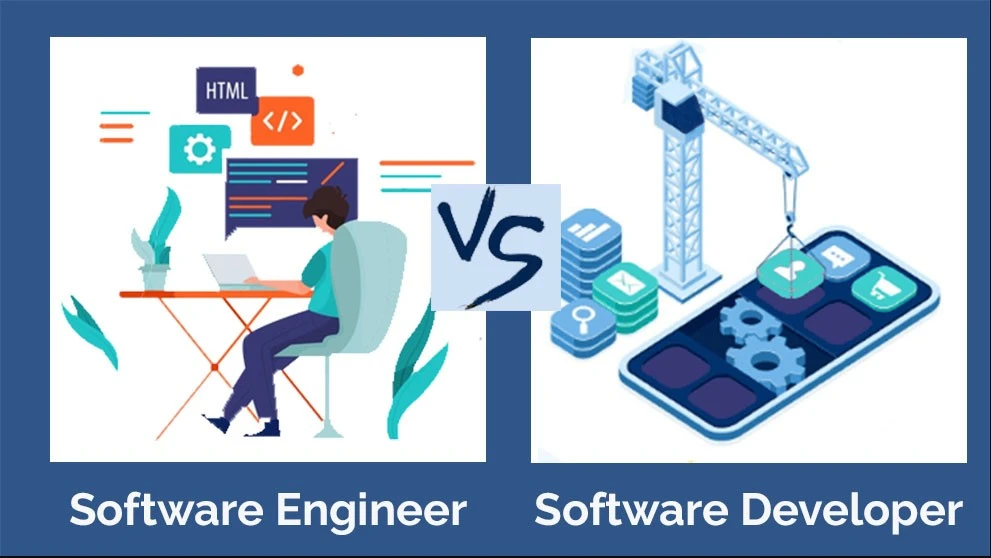Two titles are often confused in the tech world: software developer vs. software engineer. Although they may sound similar, their roles and responsibilities are quite different, just like Batman and Superman. Let’s explore the differences between these two professions.
On this Article
The Origins: Where It All Began
Before we delve into the nitty-gritty, let’s rewind the clock a bit. The work for software developers and engineers has significantly evolved from the initial days of computing to where it stands today. One could design, code, test, and deploy software with minimal support in the initial days. However, the growth of technology also came with an increase in the complexity of such tasks. The debate between a software developer and a software engineer is thus a timely question in the tech world today.
A software developer usually refers to a person who writes code for developing applications, websites, or systems. They focus on the creative aspect of constructing user-friendly interfaces and functionalities. On the other hand, a software engineer has a more systemic approach toward problems given the architecture and logic beneath the software.
The Skillset: A Tale of Two Talents
Imagine two wizards sitting in a room, both with their spellbooks titled “Development” and “Engineering.” The software developer’s spellbook contains programming languages like JavaScript, Python, and Swift on its pages. These pros master frameworks, libraries, and tools that bring ideas to life on screens. They are the artists of the coding world who take care that your favorite apps look good and work seamlessly.
The software engineer spellbook is a bit thicker, filled with pages on data structures, algorithms, and systems design. Engineers are like the architects of a software project. They lay down the blueprints, ensuring that every piece fits together perfectly and can withstand the test of time (and traffic spikes).
The Workday: What They Do
Now, let us see how their typical day looks. It could be that a software developer will spend the day sketching out new features of an app, writing code, and testing; after that, they will collaborate with designers to make it nice. They usually work in agile environments where flexibility and creativity are needed.
On the other hand, a software engineer can start their day by designing the architecture of a system and ensuring that it is robust and scalable. Engineers take a step back to look at the big picture, considering things like load balancing, data storage, and security. Engineers, in most cases, join in code reviews to ensure everything is up to standard and adheres to industry best practices.
The Toolkit: What Do They Work With
Much like a chef requires a properly equipped kitchen, so do our software superheroes with their tools. For software developers, tools like GitHub, Visual Studio Code, and Figma are just staples. These platforms assist them in writing, debugging, and designing the software. Also, they heavily depend on APIs and third-party libraries to add functionalities without reinventing the wheel.
Software engineers, on the other hand, have a very different set of tools. This includes, of course, version control systems such as Git, but it goes deep into the world of databases, cloud platforms, and infrastructure tools. AWS, Kubernetes, and Jenkins come to mind. To model complex systems, they would probably also use UML diagrams and corresponding modeling tools.
The Problem-Solving Approach: Creative vs. Systematic
How a software developer and a software engineer approach problems may vary. A software developer looks a lot like the detective in your favorite mystery novel, piecing clues together to solve a puzzle. They largely rely on intuition and creativity to find innovative solutions to challenges in the user experience. The aim is to make software intuitive, engaging, and user-friendly.
In contrast, problems are solved by software engineers more systematically and analytically. They break down issues into smaller, manageable parts and seek scientific and mathematical principles to approach their solutions. For them, it’s not just about debugging but how to prevent bugs from ever occurring. Engineers think in the long term, worrying about the scalability of their solutions and their maintainability.
The Career Path: Climbing Different Ladders
A really common pathway for a software developer is to learn how to code, master a couple of programming languages, and then a couple of frameworks. However, many developers will specialize in areas such as front-end, back-end, mobile development, or game design. As they get some experience under their belt, they most often become lead developers or move into totally different roles, like product management.
In contrast, software engineers have typically gone through a more formal education in computer science or engineering. Although their career paths might start similarly, very quickly they will move to a role that requires system design and architecture understanding. They may become senior engineers, system architects, or even CTOs. It can also go through specialized areas like DevOps, data engineering, or cybersecurity.
The World of Sheppard Software: Learning Through Play
Let’s take a fun detour to Sheppard Software, a popular platform known for its educational games. While this isn’t exactly the serious coding work of a developer or an engineer, it’s a great example of how software can be both educational and fun. It is on the part of the developers and engineers behind such platforms to balance creativity with functionality in making sure that the games are engaging but also in a position to deliver educational value.
In creating games like those on Sheppard Software, software developers focus on crafting engaging interfaces and interactive elements. Meanwhile, software engineers work behind the scenes to develop the games so that they run smoothly, handle as many people as possible without failing, and are secure. That’s a beautiful blend of creativity and technical skill—how these roles work together in perfect harmony!
Software Development Outsourcing: When to Call for Reinforcements
While most companies seem to turn to software development outsourcing in the fast-moving tech world, who do they outsource to—a developer or an engineer? That would depend on the scope and requirements of the project at hand.
Quite often, development tasks are outsourced in the form of hiring a software developer to build an application or add some features. Fresh thinking and special skills further help companies quickly roll out new products or update previous ones. Another situation that might require outsourcing is when more complex projects have to be carried out—for example, setting up a new system architecture or handling a massive data migration. Software engineers can provide technical leadership to navigate challenging projects.
The Collaboration: A Match Made in Tech Heaven
One of the most critical aspects of the software developer vs software engineer dynamic is how they collaborate. Successful software projects often require the combined efforts of both roles. A software developer might come up with an innovative feature for an app, but without the structural integrity provided by a software engineer, that feature could fall flat under heavy usage.
Equally important to the running of communication and workflows between developers and engineers are tools for collaboration, including JIRA, Slack, and Confluence. Regular stand-ups, sprint planning, and retrospectives are conducted to ensure that both sides have fallen into step with each other and are moving in the same direction. It is like a well-oiled machine where each cog plays a crucial role.
Real-World Applications: Case Studies
To better understand the impact of these roles, let’s explore some real-world case studies.
Case Study 1: The E-commerce Giant
In the case of an e-commerce company, this would involve assigning tasks to software developers to implement a seamless checkout experience so that users can buy products effortlessly. They deal with front-end design, user interactions, and the user experience. On the other hand, software engineers work at the back end on systems that manage databases storing information for all products, users, and order history. They would be tasked with ensuring that the system can support millions of transactions seamlessly and scale with the growth of the user base.
Case Study 2: The Social Media Platform
For a social media platform, software developers might create engaging features like stories, live streaming, and interactive posts. Their goal is to keep users hooked with fresh and exciting content. On the flip side, software engineers ensure that the platform’s infrastructure can support millions of simultaneous users, manage data storage efficiently, and protect user privacy with robust security measures.
Education and Training: The Road to Mastery
The paths to becoming a software developer or a software engineer vary greatly at times. Many developers get started with coding boot camps or self-taught routes by diving headfirst into learning languages such as HTML, CSS, JavaScript, and Python. These programs are typically hands-on and project-based and give aspiring developers a chance to create portfolios to show their capabilities.
In contrast, software engineers undergo formal education and receive degrees in computer science, software engineering, or other related fields. The programs address a more general range of issues: algorithms, data structures, software design patterns, and systems architecture. Internships and co-op programs are common ways to gain practical experience in addition to theoretical knowledge.
Continuous learning is essential in both roles. Developers and engineers alike must stay updated with the latest technologies, frameworks, and best practices. Certifications, online courses, and professional workshops are popular ways to keep skills sharp and relevant.
The Future of Software Development and Engineering
As technology continues to evolve, so too will the roles of software developers and software engineers. Emerging fields like artificial intelligence, machine learning, and quantum computing are already reshaping the landscape. Developers are exploring new ways to create intuitive and intelligent applications, while engineers are developing the underlying systems that make these advancements possible.
Automation and DevOps are also becoming increasingly important. Tools and practices that automate repetitive tasks and streamline workflows are allowing developers and engineers to focus more on innovation and problem-solving. This shift is fostering greater collaboration and efficiency within teams.
Virtual collaboration tools and cloud-based environments for development allow teams located in different geographic areas to work in parallel. This flexibility is taking the talent pool a step further and fostering greater diversity and respect in work cultures. This flexibility of remote working allows professionals from every walk of life and every corner of the world to have a say in their thematic areas of interest by bringing on board their rich background experiences and skill sets.
Summing Up
The software developer vs software engineer comparison can go on as each of these roles is changing as technology develops. The industry will grow, and the lines between these roles will probably blur, but both will be relevant in their own right. In simple words, developers and engineers contribute to innovation and create the future of technology. Whether you are developing user-facing applications or architecting complex systems, you can outsource both software developers and software engineers through Binate Digital. Get in touch with us to kickstart your development journey today.







